The Cambridge History of China. Vol. 12: Republican China, 1912-1949, Part 1
Подождите немного. Документ загружается.

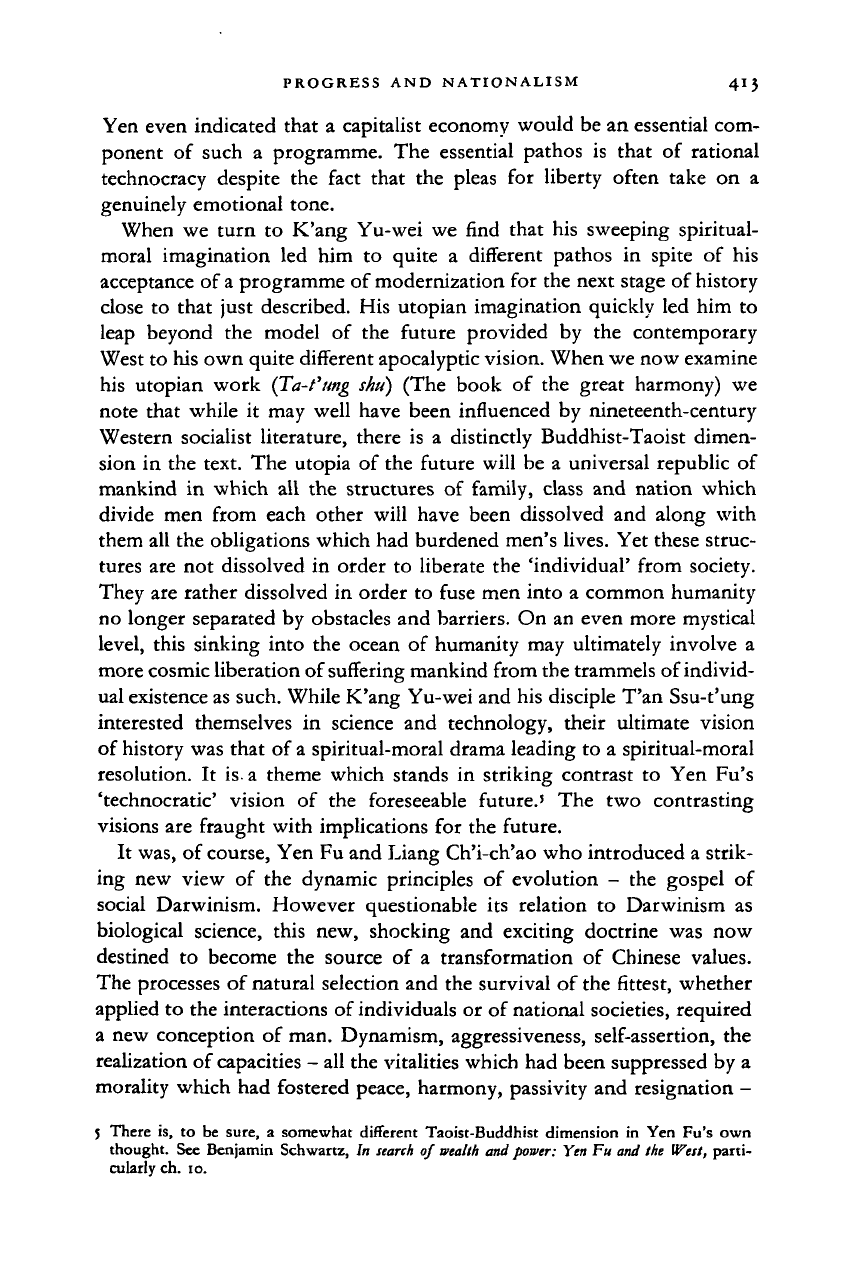
PROGRESS AND NATIONALISM 413
Yen even indicated that a capitalist economy would be an essential com-
ponent of such a programme. The essential pathos is that of rational
technocracy despite the fact that the pleas for liberty often take on a
genuinely emotional tone.
When we turn to K'ang Yu-wei we find that his sweeping spiritual-
moral imagination led him to quite a different pathos in spite of his
acceptance of
a
programme of modernization for the next stage of history
close to that just described. His Utopian imagination quickly led him to
leap beyond the model of the future provided by the contemporary
West to his own quite different apocalyptic vision. When we now examine
his Utopian work (Ta-t'ung shu) (The book of the great harmony) we
note that while it may well have been influenced by nineteenth-century
Western socialist literature, there is a distinctly Buddhist-Taoist dimen-
sion in the text. The Utopia of the future will be a universal republic of
mankind in which all the structures of family, class and nation which
divide men from each other will have been dissolved and along with
them all the obligations which had burdened men's lives. Yet these struc-
tures are not dissolved in order to liberate the 'individual' from society.
They are rather dissolved in order to fuse men into a common humanity
no longer separated by obstacles and barriers. On an even more mystical
level, this sinking into the ocean of humanity may ultimately involve a
more cosmic liberation of suffering mankind from the trammels of individ-
ual existence as such. While K'ang Yu-wei and his disciple T'an Ssu-t'ung
interested themselves in science and technology, their ultimate vision
of history was that of a spiritual-moral drama leading to a spiritual-moral
resolution. It is a theme which stands in striking contrast to Yen Fu's
'technocratic' vision of the foreseeable future.' The two contrasting
visions are fraught with implications for the future.
It was, of course, Yen Fu and Liang Ch'i-ch'ao who introduced a strik-
ing new view of the dynamic principles of evolution - the gospel of
social Darwinism. However questionable its relation to Darwinism as
biological science, this new, shocking and exciting doctrine was now
destined to become the source of a transformation of Chinese values.
The processes of natural selection and the survival of the fittest, whether
applied to the interactions of individuals or of national societies, required
a new conception of man. Dynamism, aggressiveness, self-assertion, the
realization of capacities - all the vitalities which had been suppressed by a
morality which had fostered peace, harmony, passivity and resignation -
5 There is, to be sure, a somewhat different Taoist-Buddhist dimension in Yen Fu's own
thought. See Benjamin Schwartz, In
search
of
wealth and
power:
Yen Fu and the West, parti-
cularly ch. 10.
Cambridge Histories Online © Cambridge University Press, 2008
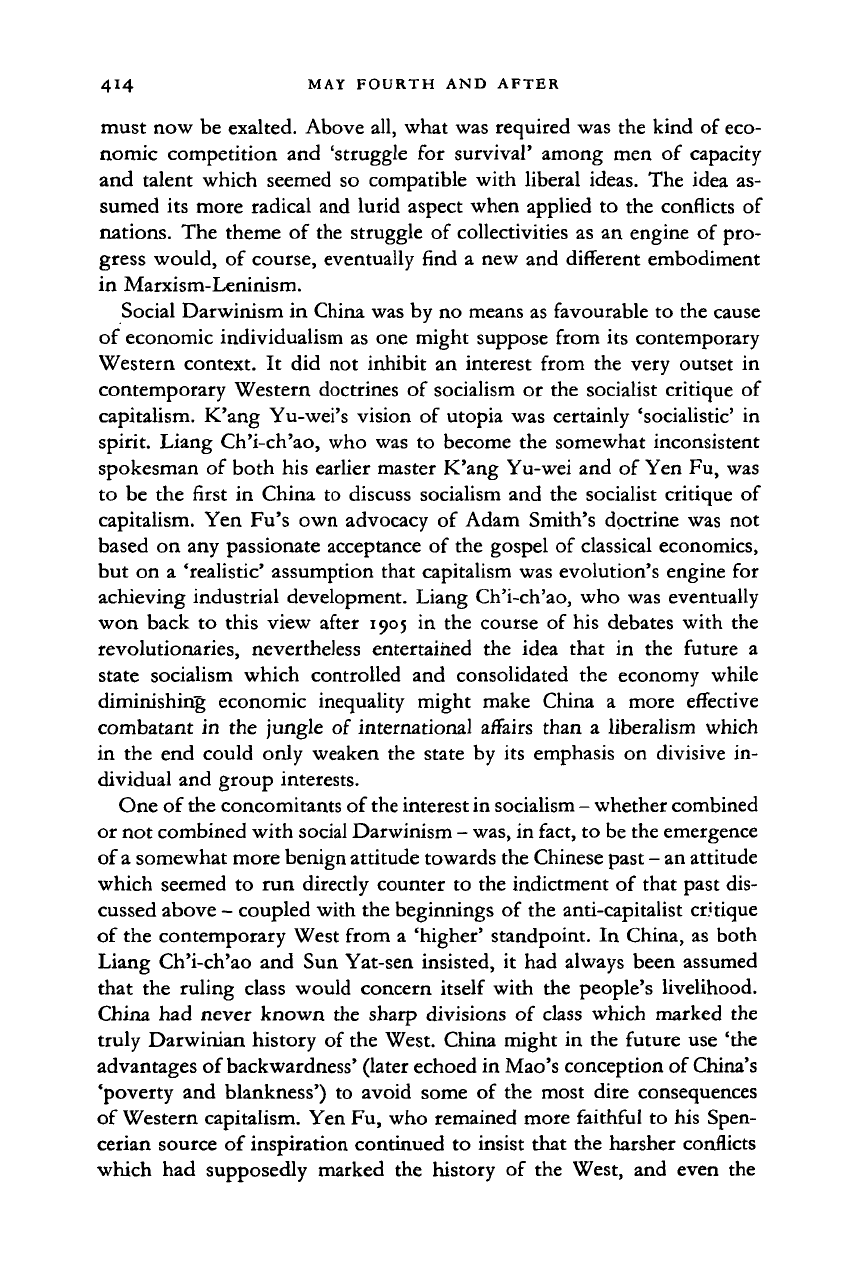
414 MAY FOURTH AND AFTER
must now be exalted. Above all, what was required was the kind of eco-
nomic competition and 'struggle for survival' among men of capacity
and talent which seemed so compatible with liberal ideas. The idea as-
sumed its more radical and lurid aspect when applied to the conflicts of
nations. The theme of the struggle of collectivities as an engine of pro-
gress would, of course, eventually find a new and different embodiment
in Marxism-Leninism.
Social Darwinism in China was by no means as favourable to the cause
of economic individualism as one might suppose from its contemporary
Western context. It did not inhibit an interest from the very outset in
contemporary Western doctrines of socialism or the socialist critique of
capitalism. K'ang Yu-wei's vision of Utopia was certainly 'socialistic' in
spirit. Liang Ch'i-ch'ao, who was to become the somewhat inconsistent
spokesman of both his earlier master K'ang Yu-wei and of Yen Fu, was
to be the first in China to discuss socialism and the socialist critique of
capitalism. Yen Fu's own advocacy of Adam Smith's doctrine was not
based on any passionate acceptance of the gospel of classical economics,
but on a 'realistic' assumption that capitalism was evolution's engine for
achieving industrial development. Liang Ch'i-ch'ao, who was eventually
won back to this view after 1905 in the course of his debates with the
revolutionaries, nevertheless entertained the idea that in the future a
state socialism which controlled and consolidated the economy while
diminishing economic inequality might make China a more effective
combatant in the jungle of international affairs than a liberalism which
in the end could only weaken the state by its emphasis on divisive in-
dividual and group interests.
One of the concomitants of the interest in socialism - whether combined
or not combined with social Darwinism - was, in fact, to be the emergence
of a somewhat more benign attitude towards the Chinese past - an attitude
which seemed to run directly counter to the indictment of that past dis-
cussed above - coupled with the beginnings of the anti-capitalist critique
of the contemporary West from a 'higher' standpoint. In China, as both
Liang Ch'i-ch'ao and Sun Yat-sen insisted, it had always been assumed
that the ruling class would concern itself with the people's livelihood.
China had never known the sharp divisions of class which marked the
truly Darwinian history of the West. China might in the future use 'the
advantages of backwardness' (later echoed in Mao's conception of China's
'poverty and blankness') to avoid some of the most dire consequences
of Western capitalism. Yen Fu, who remained more faithful to his Spen-
cerian source of inspiration continued to insist that the harsher conflicts
which had supposedly marked the history of the West, and even the
Cambridge Histories Online © Cambridge University Press, 2008
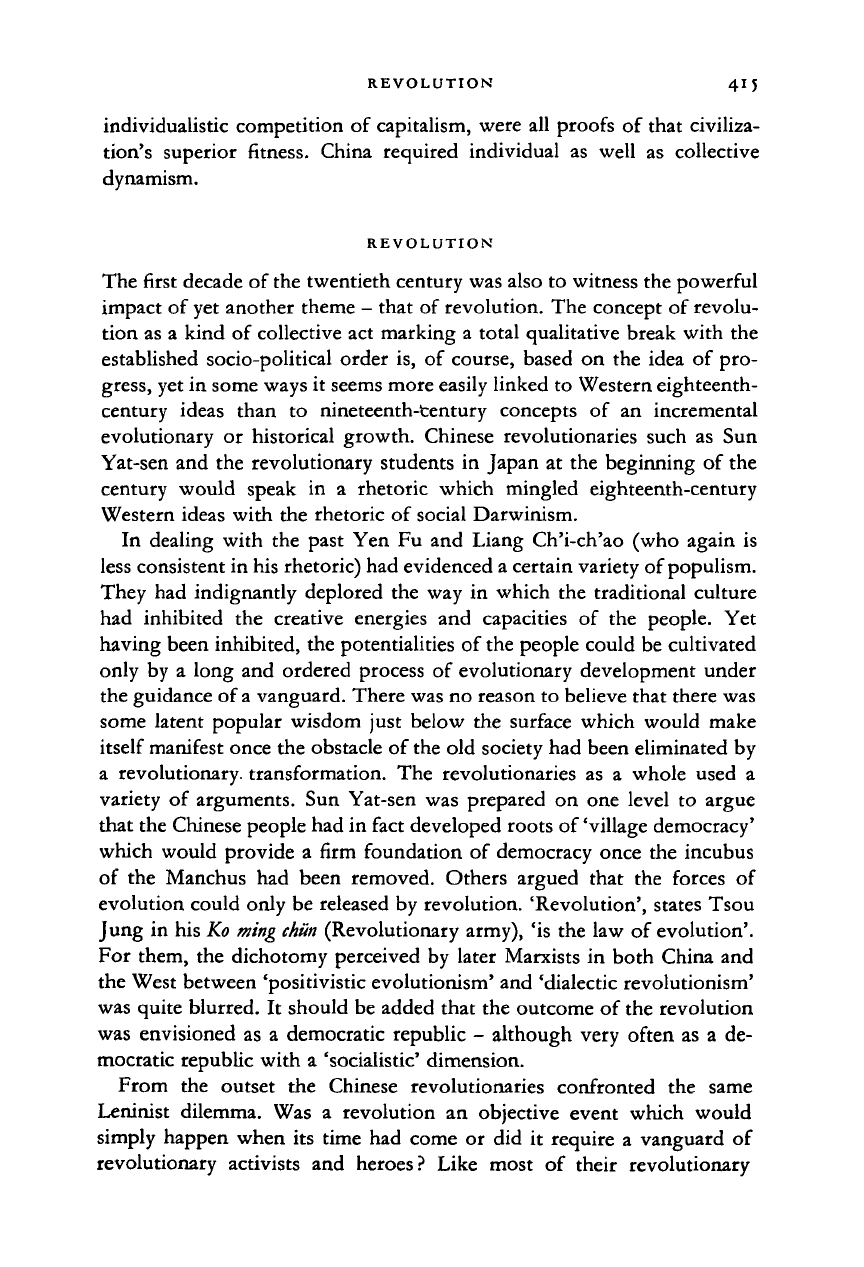
REVOLUTION 415
individualistic competition of capitalism, were all proofs of that civiliza-
tion's superior fitness. China required individual as well as collective
dynamism.
REVOLUTION
The first decade of the twentieth century was also to witness the powerful
impact of yet another theme - that of revolution. The concept of revolu-
tion as a kind of collective act marking a total qualitative break with the
established socio-political order is, of course, based on the idea of pro-
gress,
yet in some ways it seems more easily linked to Western eighteenth-
century ideas than to nineteenth-tentury concepts of an incremental
evolutionary or historical growth. Chinese revolutionaries such as Sun
Yat-sen and the revolutionary students in Japan at the beginning of the
century would speak in a rhetoric which mingled eighteenth-century
Western ideas with the rhetoric of social Darwinism.
In dealing with the past Yen Fu and Liang Ch'i-ch'ao (who again is
less consistent in his rhetoric) had evidenced a certain variety of populism.
They had indignantly deplored the way in which the traditional culture
had inhibited the creative energies and capacities of the people. Yet
having been inhibited, the potentialities of the people could be cultivated
only by a long and ordered process of evolutionary development under
the guidance of
a
vanguard. There was no reason to believe that there was
some latent popular wisdom just below the surface which would make
itself manifest once the obstacle of the old society had been eliminated by
a revolutionary, transformation. The revolutionaries as a whole used a
variety of arguments. Sun Yat-sen was prepared on one level to argue
that the Chinese people had in fact developed roots of 'village democracy'
which would provide a firm foundation of democracy once the incubus
of the Manchus had been removed. Others argued that the forces of
evolution could only be released by revolution. 'Revolution', states Tsou
Jung in his Ko
ming chun
(Revolutionary army), 'is the law of evolution'.
For them, the dichotomy perceived by later Marxists in both China and
the West between 'positivistic evolutionism' and 'dialectic revolutionism'
was quite blurred. It should be added that the outcome of the revolution
was envisioned as a democratic republic - although very often as a de-
mocratic republic with a 'socialistic' dimension.
From the outset the Chinese revolutionaries confronted the same
Leninist dilemma. Was a revolution an objective event which would
simply happen when its time had come or did it require a vanguard of
revolutionary activists and heroes? Like most of their revolutionary
Cambridge Histories Online © Cambridge University Press, 2008
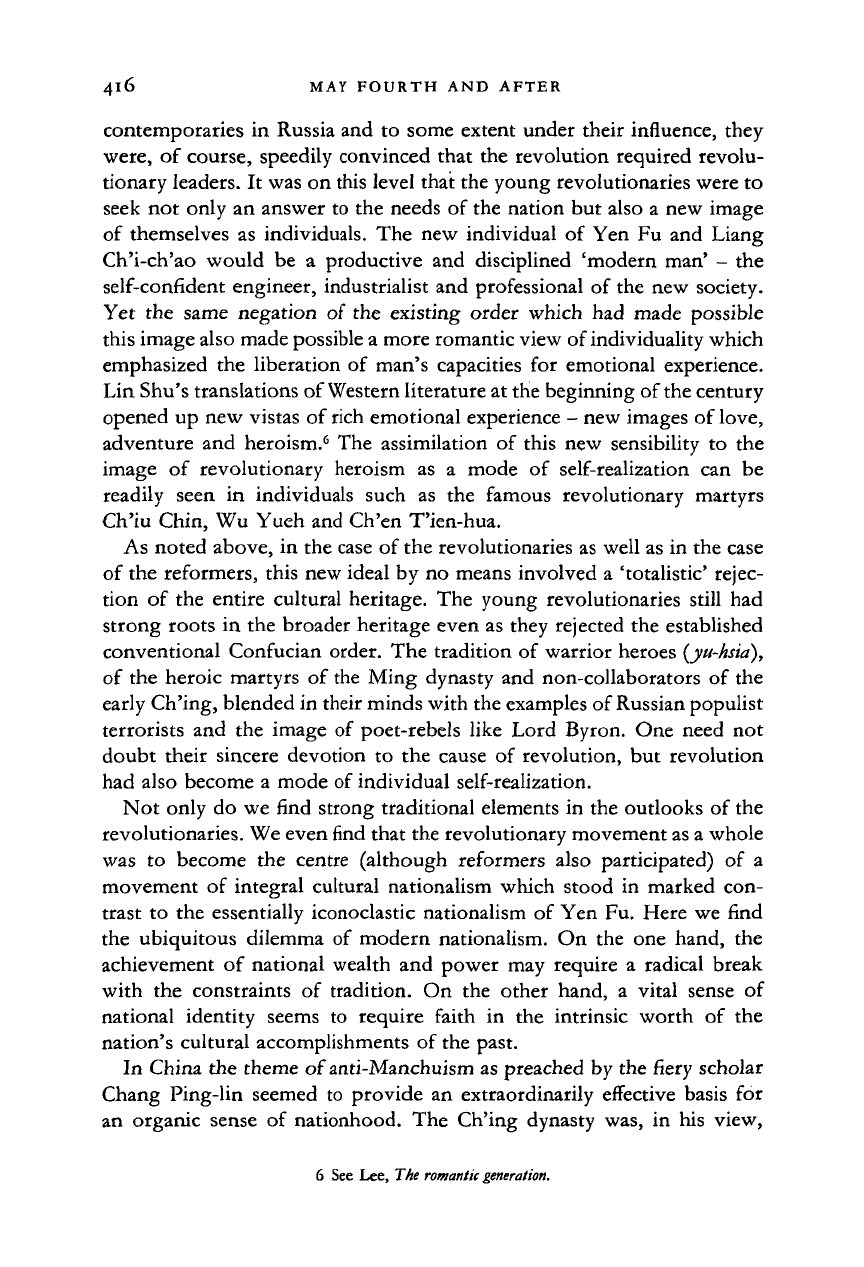
416 MAY FOURTH AND AFTER
contemporaries
in
Russia and
to
some extent under their influence, they
were,
of
course, speedily convinced that
the
revolution required revolu-
tionary leaders.
It
was
on
this level that the young revolutionaries were
to
seek
not
only
an
answer
to the
needs
of
the nation
but
also
a
new image
of themselves
as
individuals.
The new
individual
of
Yen
Fu and
Liang
Ch'i-ch'ao would
be a
productive
and
disciplined 'modern man'
- the
self-confident engineer, industrialist
and
professional
of
the
new
society.
Yet
the
same negation
of the
existing order which
had
made possible
this image also made possible a more romantic view of individuality which
emphasized
the
liberation
of
man's capacities
for
emotional experience.
Lin Shu's translations of Western literature at the beginning of the century
opened
up
new vistas
of
rich emotional experience
-
new images
of
love,
adventure
and
heroism.
6
The
assimilation
of
this
new
sensibility
to the
image
of
revolutionary heroism
as a
mode
of
self-realization
can be
readily seen
in
individuals such
as the
famous revolutionary martyrs
Ch'iu Chin,
Wu
Yueh and Ch'en T'ien-hua.
As noted above,
in
the case
of
the revolutionaries
as
well
as in the
case
of the reformers, this new ideal
by no
means involved
a
'totalistic' rejec-
tion
of the
entire cultural heritage.
The
young revolutionaries still
had
strong roots
in the
broader heritage even
as
they rejected
the
established
conventional Confucian order.
The
tradition
of
warrior heroes (ju-hsia),
of
the
heroic martyrs
of
the Ming dynasty
and
non-collaborators
of the
early Ch'ing, blended
in
their minds with the examples
of
Russian populist
terrorists
and the
image
of
poet-rebels like Lord Byron.
One
need
not
doubt their sincere devotion
to the
cause
of
revolution,
but
revolution
had also become
a
mode
of
individual self-realization.
Not only
do we
find strong traditional elements
in the
outlooks
of
the
revolutionaries. We even find that the revolutionary movement as
a
whole
was
to
become
the
centre (although reformers also participated)
of a
movement
of
integral cultural nationalism which stood
in
marked
con-
trast
to the
essentially iconoclastic nationalism
of
Yen
Fu.
Here
we
find
the ubiquitous dilemma
of
modern nationalism.
On the one
hand,
the
achievement
of
national wealth
and
power
may
require
a
radical break
with
the
constraints
of
tradition.
On the
other hand,
a
vital sense
of
national identity seems
to
require faith
in the
intrinsic worth
of the
nation's cultural accomplishments
of
the past.
In China
the
theme
of
anti-Manchuism as preached
by
the fiery scholar
Chang Ping-lin seemed
to
provide
an
extraordinarily effective basis
for
an organic sense
of
nationhood.
The
Ch'ing dynasty
was, in his
view,
6
See Lee, The
romantic
generation.
Cambridge Histories Online © Cambridge University Press, 2008
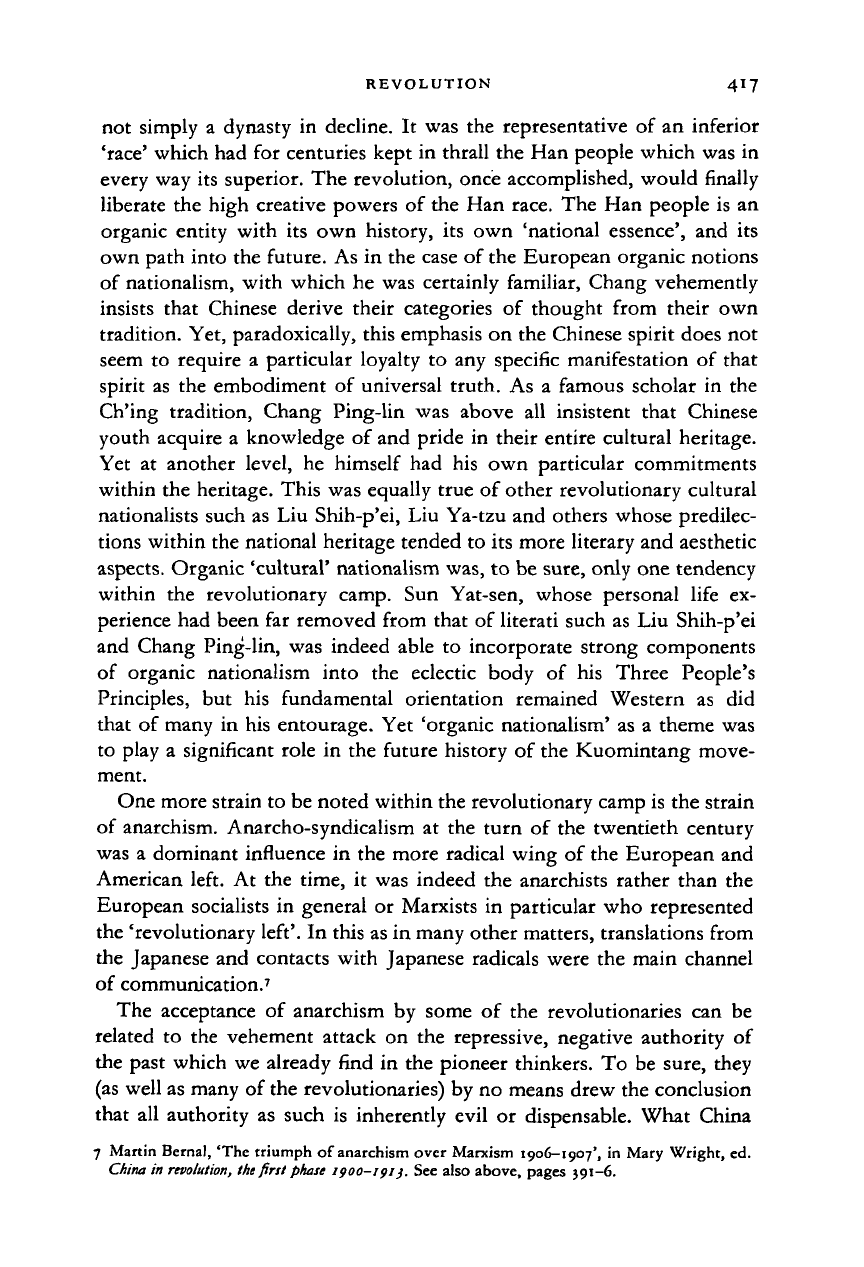
REVOLUTION
417
not simply a dynasty in decline. It was the representative of an inferior
'race'
which had for centuries kept in thrall the Han people which was in
every way its superior. The revolution, once accomplished, would finally
liberate the high creative powers of the Han race. The Han people is an
organic entity with its own history, its own 'national essence', and its
own path into the future. As in the case of the European organic notions
of nationalism, with which he was certainly familiar, Chang vehemently
insists that Chinese derive their categories of thought from their own
tradition. Yet, paradoxically, this emphasis on the Chinese spirit does not
seem to require a particular loyalty to any specific manifestation of that
spirit as the embodiment of universal truth. As a famous scholar in the
Ch'ing tradition, Chang Ping-lin was above all insistent that Chinese
youth acquire a knowledge of and pride in their entire cultural heritage.
Yet at another level, he himself had his own particular commitments
within the heritage. This was equally true of other revolutionary cultural
nationalists such as Liu Shih-p'ei, Liu Ya-tzu and others whose predilec-
tions within the national heritage tended to its more literary and aesthetic
aspects. Organic 'cultural' nationalism was, to be sure, only one tendency
within the revolutionary camp. Sun Yat-sen, whose personal life ex-
perience had been far removed from that of literati such as Liu Shih-p'ei
and Chang Ping'-lin, was indeed able to incorporate strong components
of organic nationalism into the eclectic body of his Three People's
Principles, but his fundamental orientation remained Western as did
that of many in his entourage. Yet 'organic nationalism' as a theme was
to play a significant role in the future history of the Kuomintang move-
ment.
One more strain to be noted within the revolutionary camp is the strain
of anarchism. Anarcho-syndicalism at the turn of the twentieth century
was a dominant influence in the more radical wing of the European and
American left. At the time, it was indeed the anarchists rather than the
European socialists in general or Marxists in particular who represented
the 'revolutionary left'. In this as in many other matters, translations from
the Japanese and contacts with Japanese radicals were the main channel
of communication.
7
The acceptance of anarchism by some of the revolutionaries can be
related to the vehement attack on the repressive, negative authority of
the past which we already find in the pioneer thinkers. To be sure, they
(as well as many of the revolutionaries) by no means drew the conclusion
that all authority as such is inherently evil or dispensable. What China
7 Martin Bernal, 'The triumph of anarchism over Marxism 1906-1907', in Mary Wright, ed.
China in
revolution,
the first phase ipoo-ipi). See also above, pages 391-6.
Cambridge Histories Online © Cambridge University Press, 2008
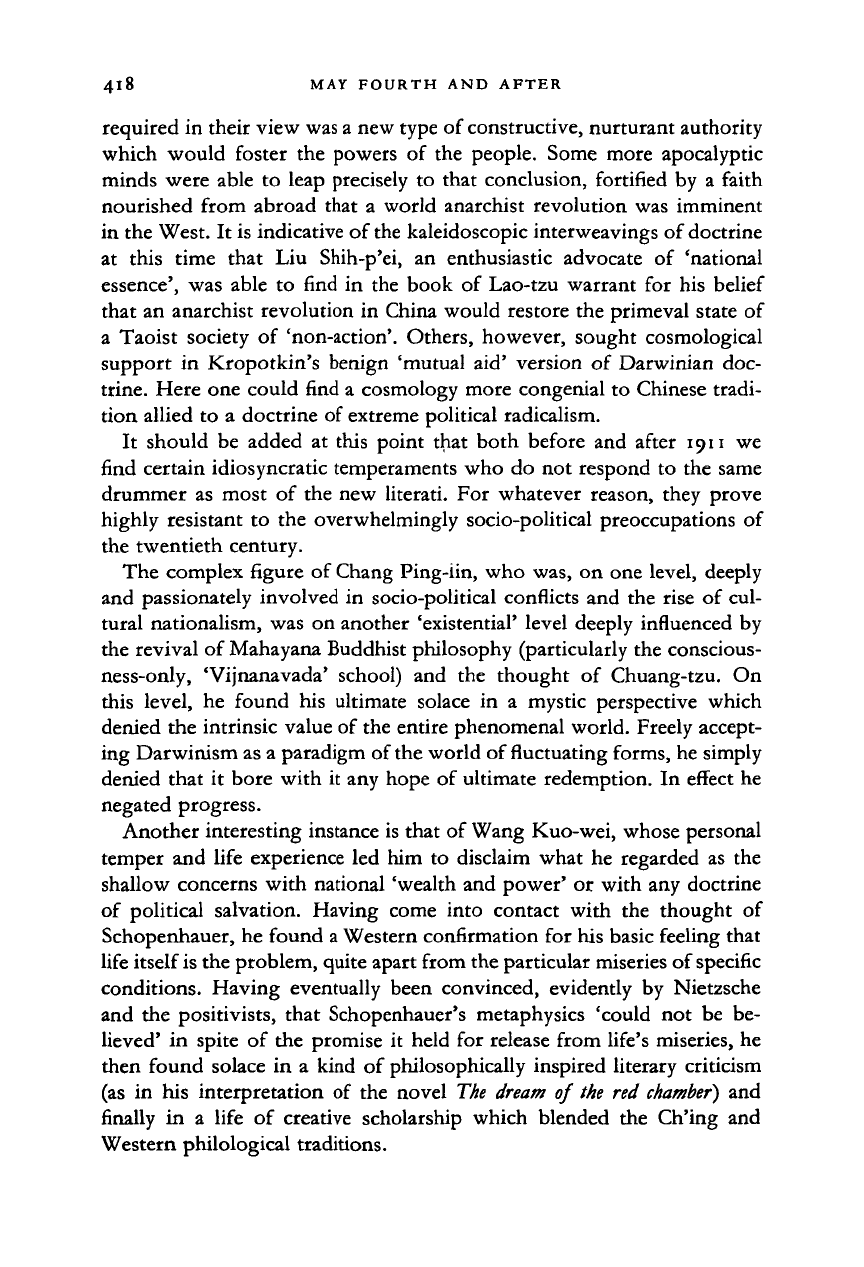
418 MAT FOURTH AND AFTER
required in their view was a new type of constructive, nurturant authority
which would foster the powers of the people. Some more apocalyptic
minds were able to leap precisely to that conclusion, fortified by a faith
nourished from abroad that a world anarchist revolution was imminent
in the West. It is indicative of the kaleidoscopic interweavings of doctrine
at this time that Liu Shih-p'ei, an enthusiastic advocate of 'national
essence', was able to find in the book of Lao-t2u warrant for his belief
that an anarchist revolution in China would restore the primeval state of
a Taoist society of 'non-action*. Others, however, sought cosmological
support in Kropotkin's benign 'mutual aid' version of Darwinian doc-
trine.
Here one could find a cosmology more congenial to Chinese tradi-
tion allied to a doctrine of extreme political radicalism.
It should be added at this point that both before and after 1911 we
find certain idiosyncratic temperaments who do not respond to the same
drummer as most of the new literati. For whatever reason, they prove
highly resistant to the overwhelmingly socio-political preoccupations of
the twentieth century.
The complex figure of Chang Ping-iin, who was, on one level, deeply
and passionately involved in socio-political conflicts and the rise of cul-
tural nationalism, was on another 'existential' level deeply influenced by
the revival of Mahayana Buddhist philosophy (particularly the conscious-
ness-only, 'Vijnanavada' school) and the thought of Chuang-tzu. On
this level, he found his ultimate solace in a mystic perspective which
denied the intrinsic value of the entire phenomenal world. Freely accept-
ing Darwinism as a paradigm of the world of fluctuating forms, he simply
denied that it bore with it any hope of ultimate redemption. In effect he
negated progress.
Another interesting instance is that of Wang Kuo-wei, whose personal
temper and life experience led him to disclaim what he regarded as the
shallow concerns with national 'wealth and power' or with any doctrine
of political salvation. Having come into contact with the thought of
Schopenhauer, he found a Western confirmation for his basic feeling that
life itself
is
the problem, quite apart from the particular miseries of specific
conditions. Having eventually been convinced, evidently by Nietzsche
and the positivists, that Schopenhauer's metaphysics 'could not be be-
lieved' in spite of the promise it held for release from life's miseries, he
then found solace in a kind of philosophically inspired literary criticism
(as in his interpretation of the novel The dream of
the
red
chamber)
and
finally in a life of creative scholarship which blended the Ch'ing and
Western philological traditions.
Cambridge Histories Online © Cambridge University Press, 2008
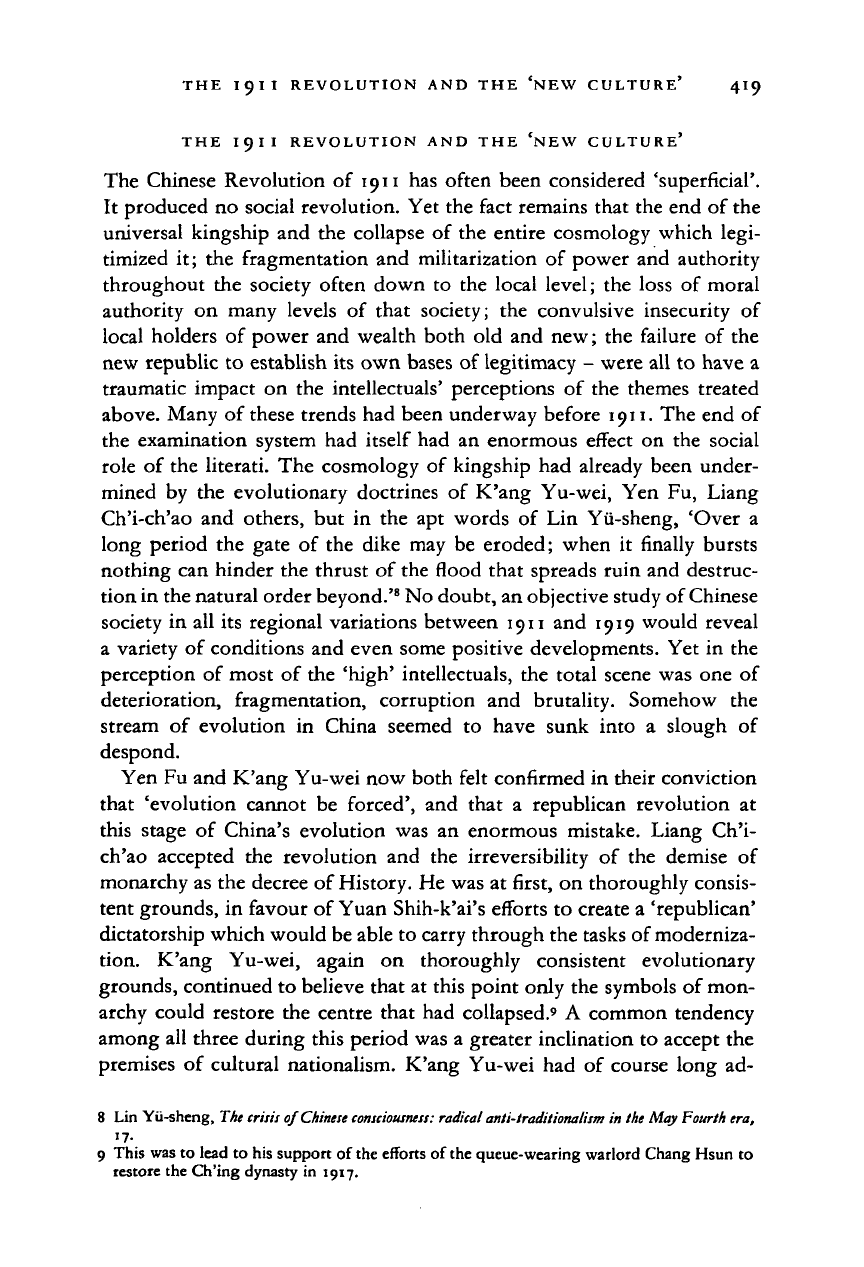
THE 191
I
REVOLUTION AND THE NEW CULTURE 419
THE 191
I
REVOLUTION AND THE 'NEW CULTURE*
The Chinese Revolution
of
1911 has often been considered 'superficial'.
It produced no social revolution. Yet the fact remains that the end of the
universal kingship and the collapse of the entire cosmology which legi-
timized it; the fragmentation and militarization of power and authority
throughout the society often down to the local level; the loss of moral
authority
on
many levels
of
that society; the convulsive insecurity
of
local holders of power and wealth both old and new; the failure of the
new republic to establish its own bases of legitimacy
-
were all to have a
traumatic impact on the intellectuals' perceptions of the themes treated
above. Many of these trends had been underway before 1911. The end of
the examination system had itself had an enormous effect on the social
role of the literati. The cosmology of kingship had already been under-
mined by the evolutionary doctrines
of
K'ang Yu-wei, Yen Fu, Liang
Ch'i-ch'ao and others, but in the apt words
of
Lin Yii-sheng, 'Over
a
long period the gate of the dike may be eroded; when
it
finally bursts
nothing can hinder the thrust of the flood that spreads ruin and destruc-
tion in the natural order beyond.'
8
No doubt, an objective study of Chinese
society in all its regional variations between 1911 and 1919 would reveal
a variety of conditions and even some positive developments. Yet in the
perception of most of the 'high' intellectuals, the total scene was one of
deterioration, fragmentation, corruption and brutality. Somehow
the
stream
of
evolution
in
China seemed
to
have sunk into
a
slough
of
despond.
Yen Fu and K'ang Yu-wei now both felt confirmed in their conviction
that 'evolution cannot be forced', and that
a
republican revolution
at
this stage
of
China's evolution was an enormous mistake. Liang Ch'i-
ch'ao accepted the revolution and the irreversibility
of
the demise
of
monarchy as the decree of History. He was at first, on thoroughly consis-
tent grounds, in favour of Yuan Shih-k'ai's efforts to create a 'republican'
dictatorship which would be able to carry through the tasks of moderniza-
tion. K'ang Yu-wei, again
on
thoroughly consistent evolutionary
grounds, continued to believe that at this point only the symbols of mon-
archy could restore the centre that had collapsed.
9
A common tendency
among all three during this period was a greater inclination to accept the
premises of cultural nationalism. K'ang Yu-wei had of course long ad-
8 Lin Yii-sheng,
The crisis
of
Chinese
consciousness:
radical anti-traditionalism
in the May
Fourth
era,
'7-
9 This was to lead to his support of the efforts of the queue-wearing warlord Chang Hsun to
restore the Ch'ing dynasty in 1917.
Cambridge Histories Online © Cambridge University Press, 2008
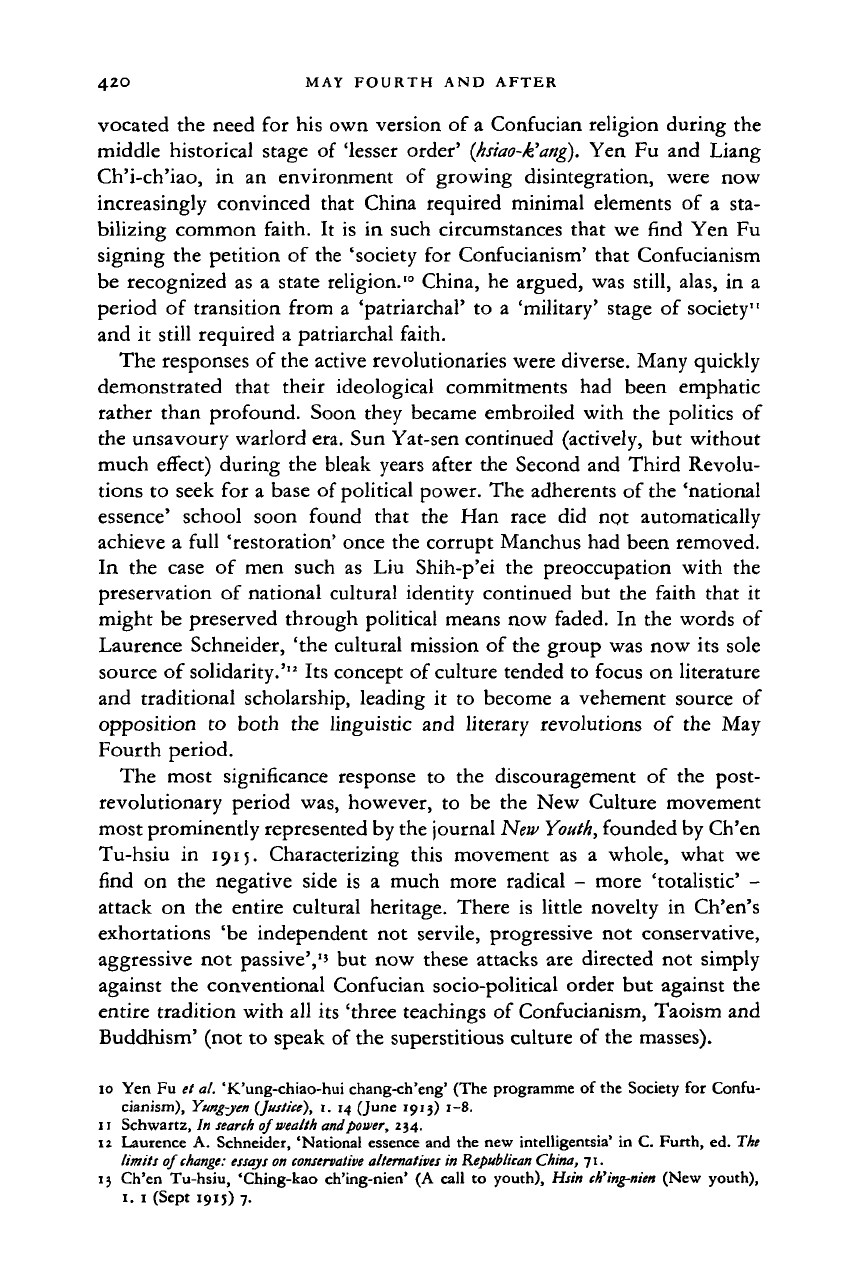
42O MAY FOURTH AND AFTER
vocated the need for his own version of a Confucian religion during the
middle historical stage of 'lesser order'
(hsiao-k'ang).
Yen Fu and Liang
Ch'i-ch'iao, in an environment of growing disintegration, were now
increasingly convinced that China required minimal elements of a sta-
bilizing common faith. It is in such circumstances that we find Yen Fu
signing the petition of the 'society for Confucianism' that Confucianism
be recognized as a state religion.
10
China, he argued, was still, alas, in a
period of transition from a 'patriarchal' to a 'military' stage of society"
and it still required a patriarchal faith.
The responses of the active revolutionaries were diverse. Many quickly
demonstrated that their ideological commitments had been emphatic
rather than profound. Soon they became embroiled with the politics of
the unsavoury warlord era. Sun Yat-sen continued (actively, but without
much effect) during the bleak years after the Second and Third Revolu-
tions to seek for a base of political power. The adherents of the 'national
essence' school soon found that the Han race did not automatically
achieve a full 'restoration' once the corrupt Manchus had been removed.
In the case of men such as Liu Shih-p'ei the preoccupation with the
preservation of national cultural identity continued but the faith that it
might be preserved through political means now faded. In the words of
Laurence Schneider, 'the cultural mission of the group was now its sole
source of solidarity.'
12
Its concept of culture tended to focus on literature
and traditional scholarship, leading it to become a vehement source of
opposition to both the linguistic and literary revolutions of the May
Fourth period.
The most significance response to the discouragement of the post-
revolutionary period was, however, to be the New Culture movement
most prominently represented by the journal New
Youth,
founded by Ch'en
Tu-hsiu in 1915. Characterizing this movement as a whole, what we
find on the negative side is a much more radical - more 'totalistic' -
attack on the entire cultural heritage. There is little novelty in Ch'en's
exhortations 'be independent not servile, progressive not conservative,
aggressive not passive',
1
' but now these attacks are directed not simply
against the conventional Confucian socio-political order but against the
entire tradition with all its 'three teachings of Confucianism, Taoism and
Buddhism' (not to speak of the superstitious culture of the masses).
10 Yen Fu et al. 'K'ung-chiao-hui chang-ch'eng' (The programme of the Society for Confu-
cianism), Yung-yen (Justice), 1. 14 (June 1913) 1-8.
11 Schwartz, In
search
of wealth and power, 234.
12 Laurence A. Schneider, 'National essence and the new intelligentsia* in C. Furth, ed. The
limits of
change:
essays
on
conservative alternatives
in
Republican
China, 71.
13 Ch'en Tu-hsiu, 'Ching-kao ch'ing-nien' (A call to youth), Hsin
ch'ing-nien
(New youth),
1.
1 (Sept 1915) 7.
Cambridge Histories Online © Cambridge University Press, 2008
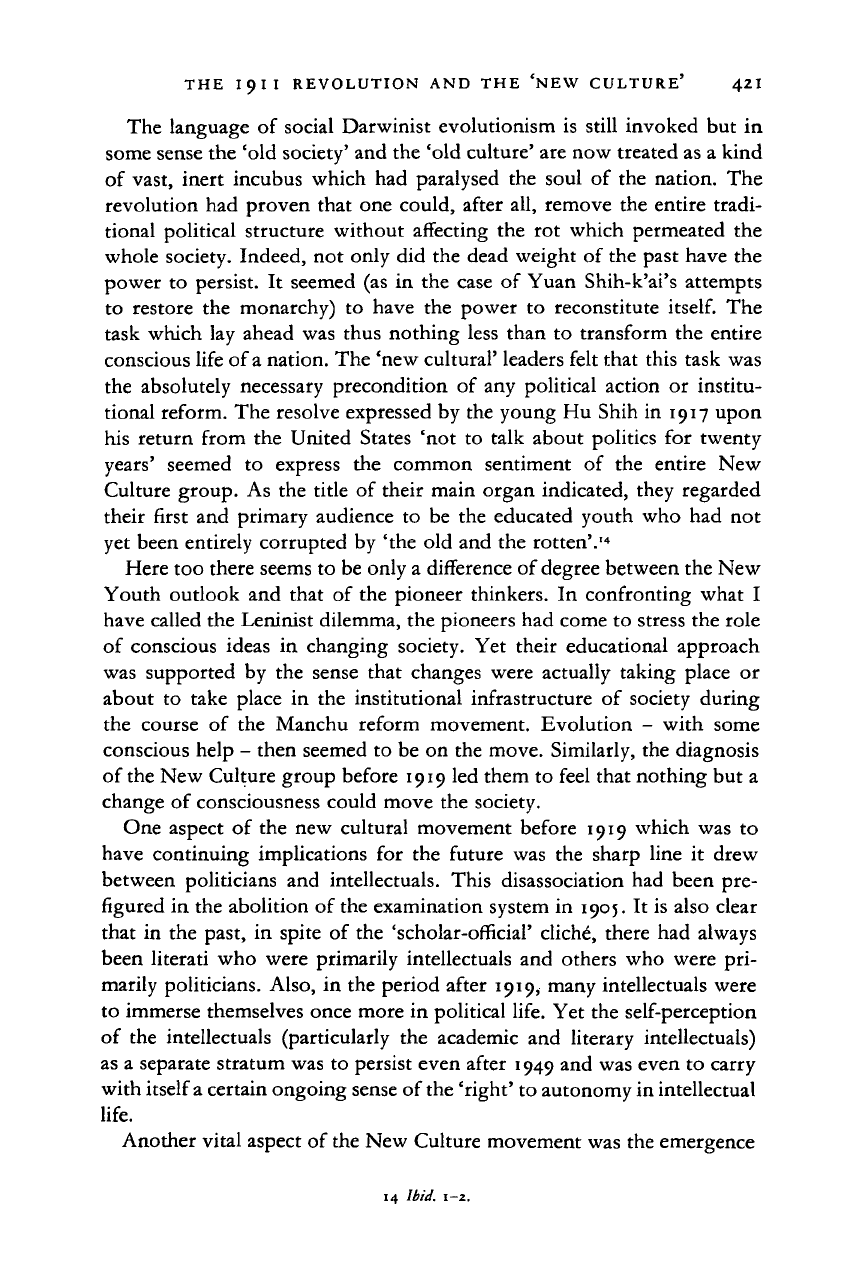
THE 191
I
REVOLUTION AND THE NEW CULTURE 42I
The language of social Darwinist evolutionism is still invoked but in
some sense the 'old society' and the 'old culture' are now treated as a kind
of vast, inert incubus which had paralysed the soul of the nation. The
revolution had proven that one could, after all, remove the entire tradi-
tional political structure without affecting the rot which permeated the
whole society. Indeed, not only did the dead weight of the past have the
power to persist. It seemed (as in the case of Yuan Shih-k'ai's attempts
to restore the monarchy) to have the power to reconstitute
itself.
The
task which lay ahead was thus nothing less than to transform the entire
conscious life of
a
nation. The 'new cultural' leaders felt that this task was
the absolutely necessary precondition of any political action or institu-
tional reform. The resolve expressed by the young Hu Shih in 1917 upon
his return from the United States 'not to talk about politics for twenty
years'
seemed to express the common sentiment of the entire New
Culture group. As the title of their main organ indicated, they regarded
their first and primary audience to be the educated youth who had not
yet been entirely corrupted by 'the old and the rotten'.
14
Here too there seems to be only a difference of degree between the New
Youth outlook and that of the pioneer thinkers. In confronting what I
have called the Leninist dilemma, the pioneers had come to stress the role
of conscious ideas in changing society. Yet their educational approach
was supported by the sense that changes were actually taking place or
about to take place in the institutional infrastructure of society during
the course of the Manchu reform movement. Evolution - with some
conscious help - then seemed to be on the move. Similarly, the diagnosis
of the New Culture group before 1919 led them to feel that nothing but a
change of consciousness could move the society.
One aspect of the new cultural movement before 1919 which was to
have continuing implications for the future was the sharp line it drew
between politicians and intellectuals. This disassociation had been pre-
figured in the abolition of the examination system in 1905. It is also clear
that in the past, in spite of the 'scholar-official' cliche, there had always
been literati who were primarily intellectuals and others who were pri-
marily politicians. Also, in the period after 1919, many intellectuals were
to immerse themselves once more in political life. Yet the self-perception
of the intellectuals (particularly the academic and literary intellectuals)
as a separate stratum was to persist even after 1949 and was even to carry
with itself
a
certain ongoing sense of the 'right' to autonomy in intellectual
life.
Another vital aspect of the New Culture movement was the emergence
14
Ibid.
1-2.
Cambridge Histories Online © Cambridge University Press, 2008
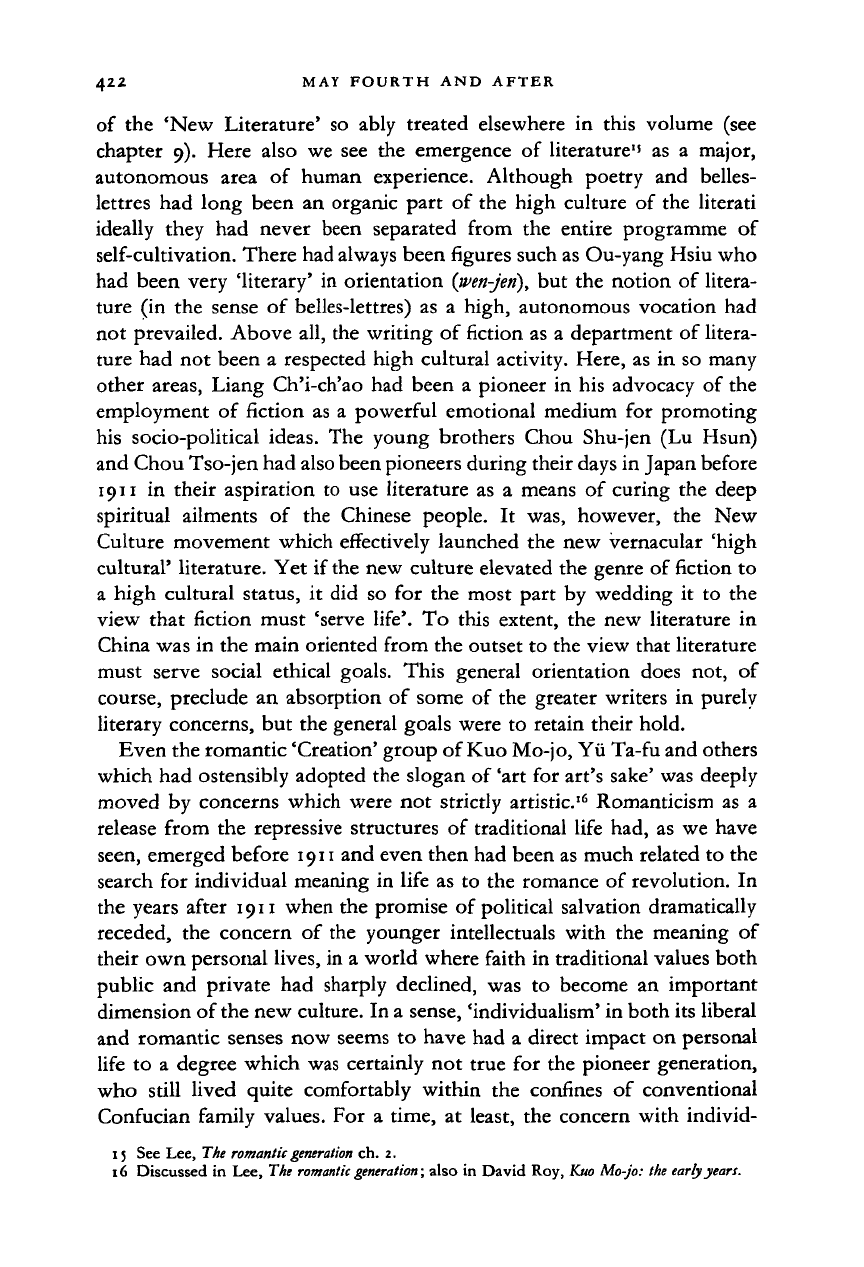
422 MAY FOURTH AND AFTER
of the 'New Literature' so ably treated elsewhere in this volume (see
chapter 9). Here also we see the emergence of literature
1
' as a major,
autonomous area of human experience. Although poetry and belles-
lettres had long been an organic part of the high culture of the literati
ideally they had never been separated from the entire programme of
self-cultivation. There had always been figures such as Ou-yang Hsiu who
had been very 'literary' in orientation
(wen-Jen),
but the notion of litera-
ture (in the sense of belles-lettres) as a high, autonomous vocation had
not prevailed. Above all, the writing of fiction as a department of litera-
ture had not been a respected high cultural activity. Here, as in so many
other areas, Liang Ch'i-ch'ao had been a pioneer in his advocacy of the
employment of fiction as a powerful emotional medium for promoting
his socio-political ideas. The young brothers Chou Shu-jen (Lu Hsun)
and Chou Tso-jen had also been pioneers during their days in Japan before
1911 in their aspiration to use literature as a means of curing the deep
spiritual ailments of the Chinese people. It was, however, the New
Culture movement which effectively launched the new vernacular 'high
cultural' literature. Yet if the new culture elevated the genre of fiction to
a high cultural status, it did so for the most part by wedding it to the
view that fiction must 'serve life'. To this extent, the new literature in
China was in the main oriented from the outset to the view that literature
must serve social ethical goals. This general orientation does not, of
course, preclude an absorption of some of the greater writers in purely
literary concerns, but the general goals were to retain their hold.
Even the romantic 'Creation' group of Kuo Mo-jo, Yii Ta-fu and others
which had ostensibly adopted the slogan of 'art for art's sake' was deeply
moved by concerns which were not strictly artistic.'
6
Romanticism as a
release from the repressive structures of traditional life had, as we have
seen, emerged before 1911 and even then had been as much related to the
search for individual meaning in life as to the romance of revolution. In
the years after 1911 when the promise of political salvation dramatically
receded, the concern of the younger intellectuals with the meaning of
their own personal lives, in a world where faith in traditional values both
public and private had sharply declined, was to become an important
dimension of the new culture. In a sense, 'individualism' in both its liberal
and romantic senses now seems to have had a direct impact on personal
life to a degree which was certainly not true for the pioneer generation,
who still lived quite comfortably within the confines of conventional
Confucian family values. For a time, at least, the concern with individ-
15 See Lee, Tie
romantic generation
ch. 2.
16 Discussed in Lee, The
romantic
generation;
also in David Roy, Kuo Mo-jo: the early years.
Cambridge Histories Online © Cambridge University Press, 2008
